Table of contents
What is Reputation Marketing? Boost Your Business in 10 Steps [2025]
Next to Coca-Cola and Pepsi, Red Bull is the most recognizable and valuable beverage brand in the world. During the last 30 days, it was mentioned online over 40,000 times, reaching nearly 1 billion people! What’s the secret of Red Bull’s outstanding success? Well, the answer lies in reputation marketing.
Quick summary:
– Reputation marketing is the practice of promoting a brand, business, or person by using elements like positive reviews, customer testimonials, ratings, social proof, user-generated content on social media, and much more to build trust and attract new customers.
– It involves highlighting favorable feedback while managing online perceptions to create a strong & credible brand image.
– Reputation marketing differs from traditional marketing by focusing on promoting positive feedback and aligning with core brand values, unlike traditional marketing, which centers on company messaging.
– The ultimate goal of reputation marketing is to turn it into a competitive advantage.
Everyone’s aiming for an excellent reputation.
No surprise!
There’s nothing sweeter for a business owner to read all these good online reviews and praises about the brand’s reputation.
Unfortunately, negative reviews happen even to the best of us. But there are many ways to turn negative feedback into good and enforce positive brand content.
In this article, you’ll learn everything about online reputation marketing strategy:
- How to use it to your advantage
- Essential tools
- Real-life examples
- & so much more!
Enjoy!
What is reputation marketing?
Reputation marketing refers to the strategic effort of shaping and influencing how others see a brand, business, or individual.
It merges reputation management and brand marketing.
This ensures that the brand is seen in a positive light and that its positive reputation is leveraged in promotional efforts.
In today’s digital age, where:
- Customer engagement is vital
- Consumers frequently rely on online reviews
- People check testimonials before purchasing or choosing a service
Reputation marketing becomes crucial for businesses of all sizes!
Boost your reputation marketing with Brand24!
What efforts can reputation marketing include?
- Responding to negative reviews and customer feedback.
- Sharing positive brand content on social media.
- Any PR activities like interviews in local news or collabs with brands from your niche.
- Taking care of search engine optimization and what pops up when someone googles your brand’s name.
- Having a pre-established reputation marketing strategy with key actions for pr crises.
With that said, let’s take action!
You probably wonder how to create an effective reputation marketing strategy that can be implemented to improve your company’s reputation.
Here’s my guide on creating a strong reputation marketing strategy:
How to create a reputation marketing strategy for your business? 10 steps
A strong reputation is a valuable marketing asset that can drive business growth and customer trust.
Here’s what you need to consider when creating your reputation marketing strategy:
01 Check the current reputation
Before you begin any planning, you need to conduct a thorough audit of your current brand’s online presence and reputation. Okay, but how do you do it in practice?
The most convenient and effective way is to use appropriate media monitoring tools. Why?
Because such tools offer comprehensive functionalities that allow you to check multiple reputation metrics in real-time, making you understand what works in your favor (and what doesn’t).
I’ll show you it in the example of Brand24, the leading media monitoring tool. I like this software because of its AI-powered features, friendly UX, and tracking mentions from multiple sources:
- Social media platforms like Facebook, Instagram, X (Twitter), YouTube, TikTok, LinkedIn, Reddit, Twitch, and Telegram;
- News sites, blogs, podcasts, video platforms, newsletters, and other websites;
- Online review sites (TripAdvisor, Yelp, Booking.com, App Store, Google Play, and Trustpilot).
Try the best reputation marketing tool!
What’s super important is that Brand24 tracks both tagged & untagged mentions. Why is it important?
Because the Internet is full of untagged mentions that go unnoticed!
Each time someone discusses your brand without tagging it, you risk missing valuable feedback or potential issues.
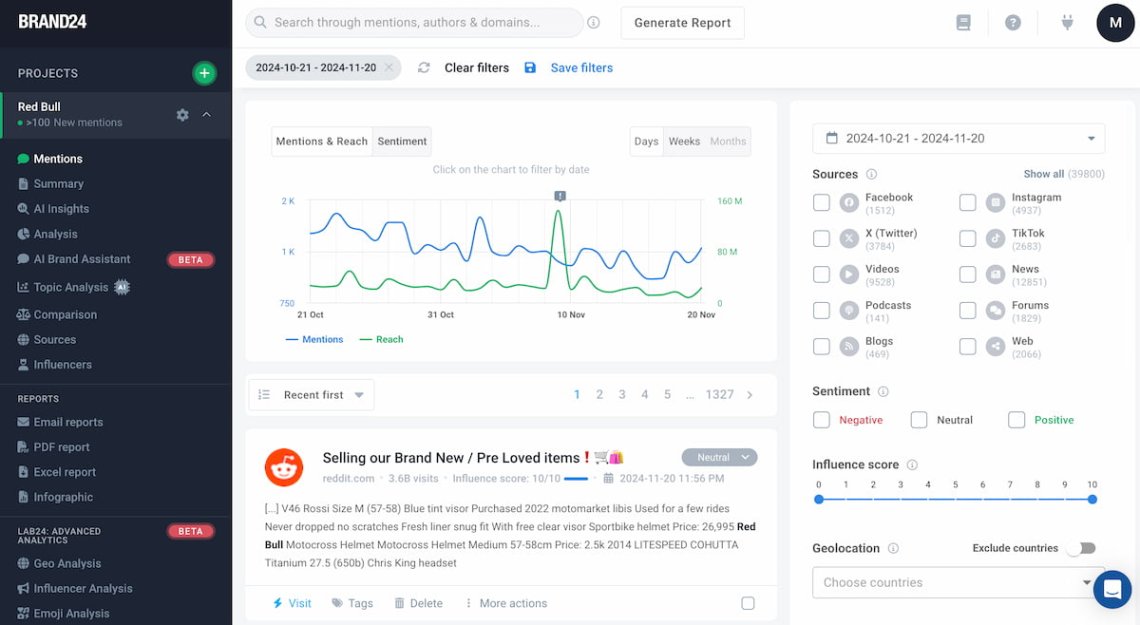
So, how do you check your current brand’s reputation?
- Conduct sentiment analysis
Tracking the volume and reach of your brand mentions is cool, but it is definitely not enough to assess your current reputation.
What really matters are the emotions driving people to write about your brand. And here, the sentiment analysis enters the stage!
As its name suggests, sentiment analysis is a method of analyzing text to identify its intent.
It aims to automatically recognize feelings hidden behind the words and categorize them into one of three types: positive, negative, and neutral.
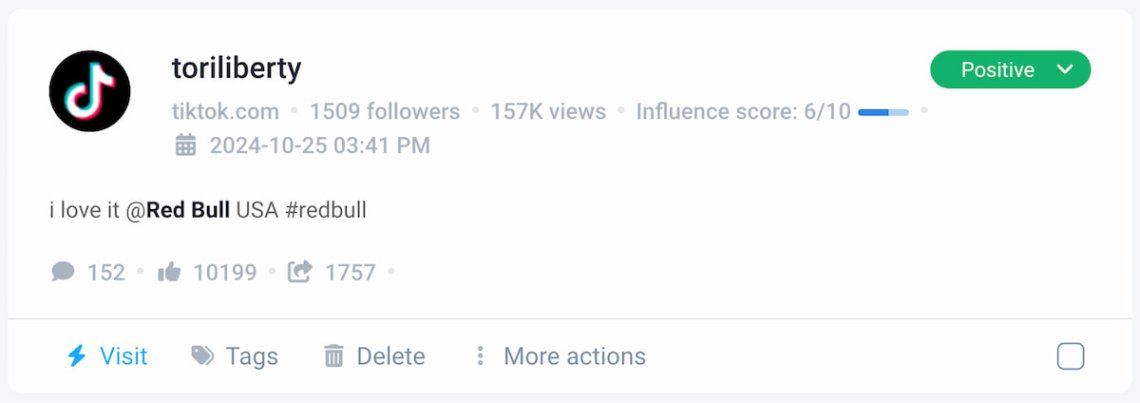
You can analyze each mention one by one, but it’s quite time-consuming – especially if you get hundreds or even thousands of them.
Thankfully, Brand24 presents all your mentions on an intuitive chart. It’s super simple – if the green line rises, positive sentiment is growing; if the red line spikes, negative sentiment is increasing.
Just look at the example below:
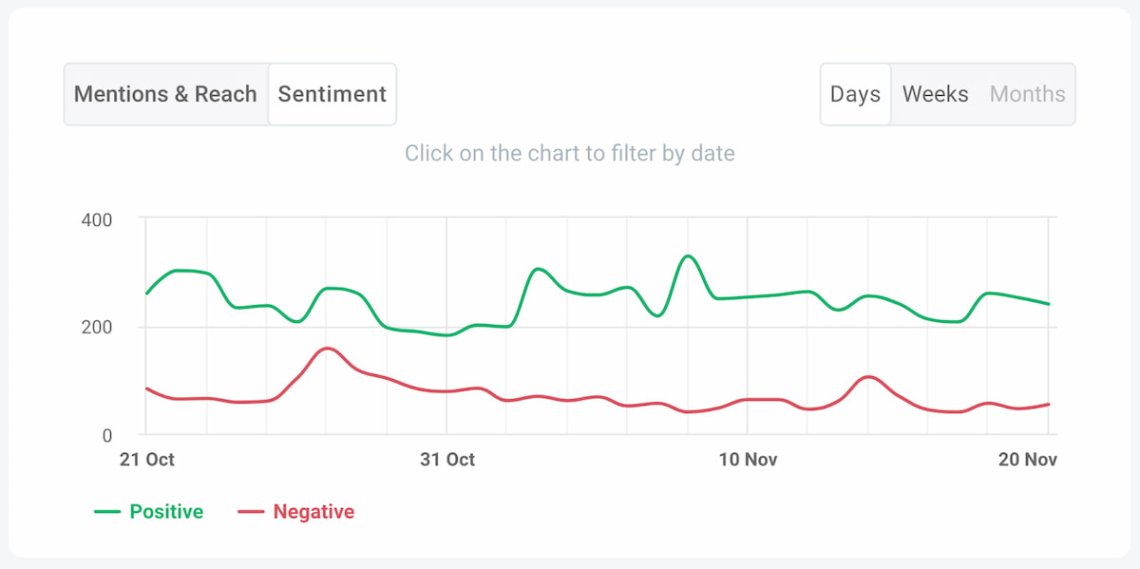
It’s Red Bull’s sentiment analysis chart below. The brand obviously goes well in terms of its reputation!
Bonus: Read about how to do AI customer sentiment analysis in 2025 [A step-by-step guide].
- Check your Presence Score
The second handy metric to check whether your reputation marketing efforts are enough is the Presence Score.
As its name suggests, this metric shows your brand’s presence online. The more mentions and reach of your brand mentions, the higher your Presence Score.
And as you might have guessed, increasing your online visibility is essential to a business reputation.

Check your sentiment analysis & Presence Score now!
02 Set clear goals
You cannot plan a reputation marketing strategy without setting any goals.
So, determine what you want to achieve!
It can be things like:
- Improving online ratings
- Increasing positive reviews
- Enhancing brand perception in specific areas
Tracking your reputation marketing goals is crucial, as it can directly impact business performance and help you measure the effectiveness of your strategy.
Set your reputation marketing objectives with Brand24!
Okay, but how to discover which areas can bring you the most ROI when it comes to your reputation marketing?
Well, there are dozens of advices I could give you. But I will simplify it one thing: ask AI!
We live in the era of artificial intelligence. So don’t be scared to use it!
However, instead of relying on generic AI chatbots, focus on specialized AI tools designed for reputation marketing. Why?
Because these tools can access detailed, brand-specific data, allowing them to provide more accurate and tailored insights.
For example, the AI Brand Assistant works like ChatGPT but accesses real data from your media monitoring project
I asked a question: “What should Red Bull focus on if the brand wants to improve its reputation marketing?”.
In just 15 seconds, the Brand Assistant provided me with 6 actionable tips to enhance Red Bull’s reputation marketing efforts.
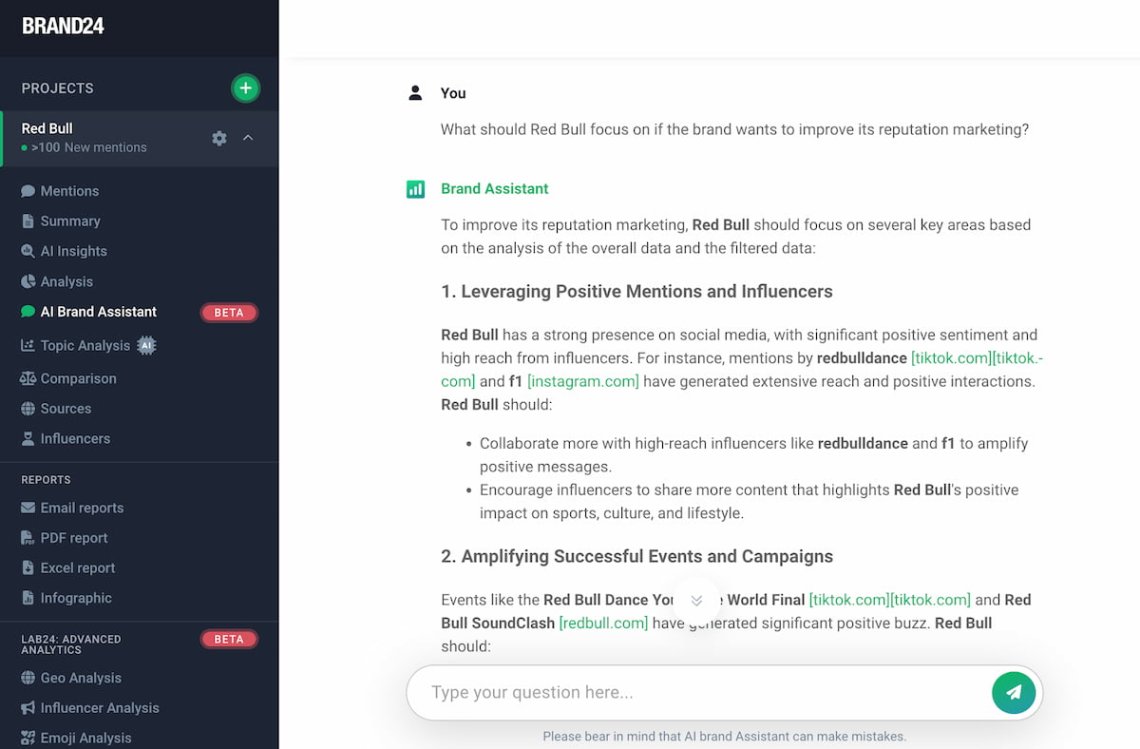
Each tip was precisely explained and data-backed.
Awesome!
Access AI Brand Assistant!
03 Encourage customer reviews
Reviews are one of the most important factors in improving your brand’s online presence. They inform you how real people perceive your products or services.
In fact, according to the BrightLocal study, 50% of consumers trust online reviews as much as personal recommendations from friends and family.
Especially small businesses should invest in encouraging satisfied customers to write positive mentions, as there are not a lot of them available online yet.
It’s simple. If your brand is not well known (yet), your potential customers will likely look for any opinions about your company online.
Plus, positive customer reviews on third-party review platforms like Google Business Profile, Yelp, and Trustpilot can significantly influence prospective customers’ decisions, as these platforms are seen as more credible and trustworthy sources.
The more positive reviews you gain, the more likely people are to purchase your products.
See how people review your brand!
04 Amplifying positive brand content
According to Influencer Marketing Hub, 72% of consumers consider customer reviews and testimonials more credible than when a company or brand talks about itself.
What does it mean to you?
To use the full potential of positive reviews, you must showcase them:
- Highlight positive testimonials and reviews on your website.
- Share them in your social media posts, newsletters, and other marketing materials
- & amplify their reach and impact!
Here’s a real-life example of good online reputation marketing:
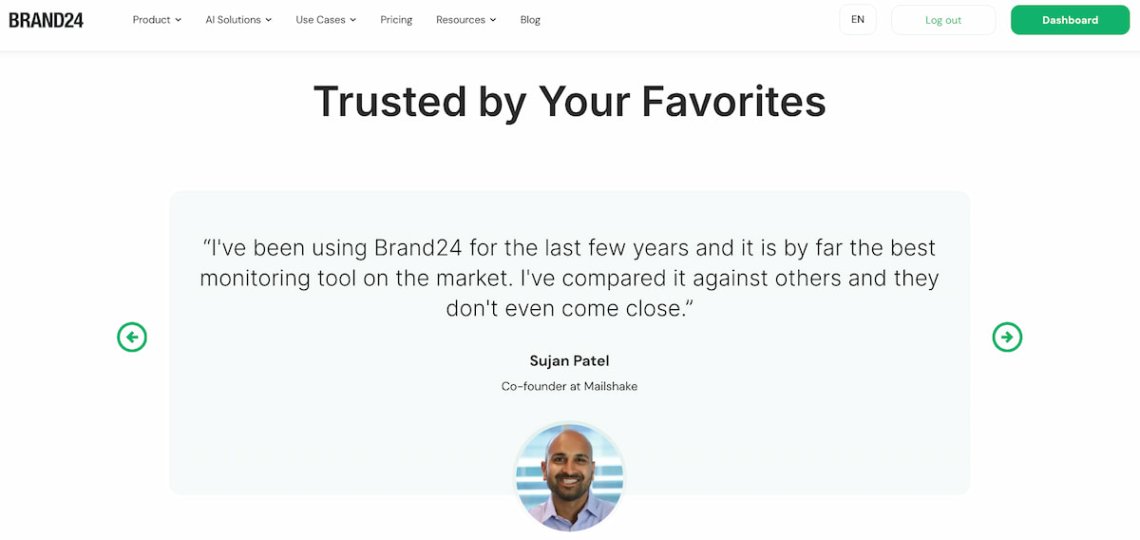
Showcase studies by creating compelling stories or content around customer success.
Trust me, it works great, especially in B2B marketing!
Don’t stop there and add positive feedback into your marketing materials on social media platforms.
According to the How Shopper Behavior is Changing study, ads featuring reviews achieve 4 times higher click-through rates and are twice as cheap in terms of cost per acquisition and cost per click.
Try the best reputation marketing tool!
05 Engage with your audience
Engaging with customers on social media platforms, review sites, and other online forums is extremely important.
And there are many stats proving that!
It is enough to mention that brands that engage with their customers on social media can reduce their cost per contact by 83%
Simply put, responding to both positive and negative feedback shared in reviews, comments, and messages shows that a brand really values its customers’ opinions.
In fact, customers expect businesses to respond promptly to both positive and negative feedback, which is crucial for effective reputation marketing.
Additionally, being responsive adds to your genuineness and shows there are real people behind the brand (especially in the times of AI replacing humans wherever possible).
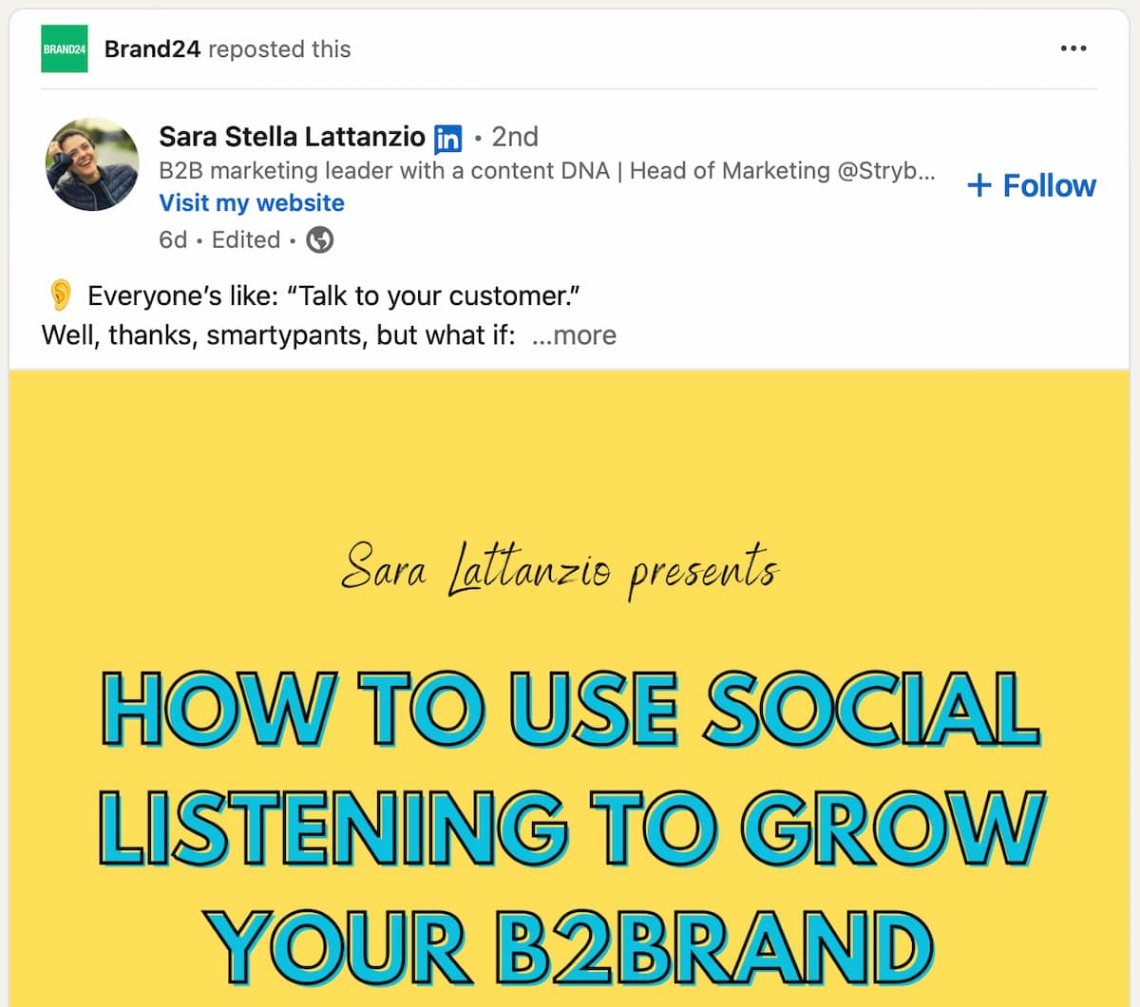
Always praise people who talk positively about you on social media platforms!
There’s nothing worse than leaving user-generated content unattended.
And it doesn’t really matter if the fostered review is positive or negative.
According to the abovementioned BrightLocal study, 88% of customers are likely to use a business based on how it responds to online reviews.
Power up your reputation marketing with Brand24!
06 Address negative feedback constructively
Negative customer feedback has two sides:
- It can be a chance to improve your product or service
- It can also harm your reputation.
How you handle it matters the most.
Consider these key stats:
- 52% of customers expect a reply within a week;
- 96% of consumers specifically look for negative reviews before deciding to click “Buy”.
It means two things.
First, you must address negative comments quickly.
Second, when you respond, do it with understanding, apologize if necessary, and offer a clear solution.
Doing so not only resolves the problem but also shows other potential customers watching how you handle criticism.
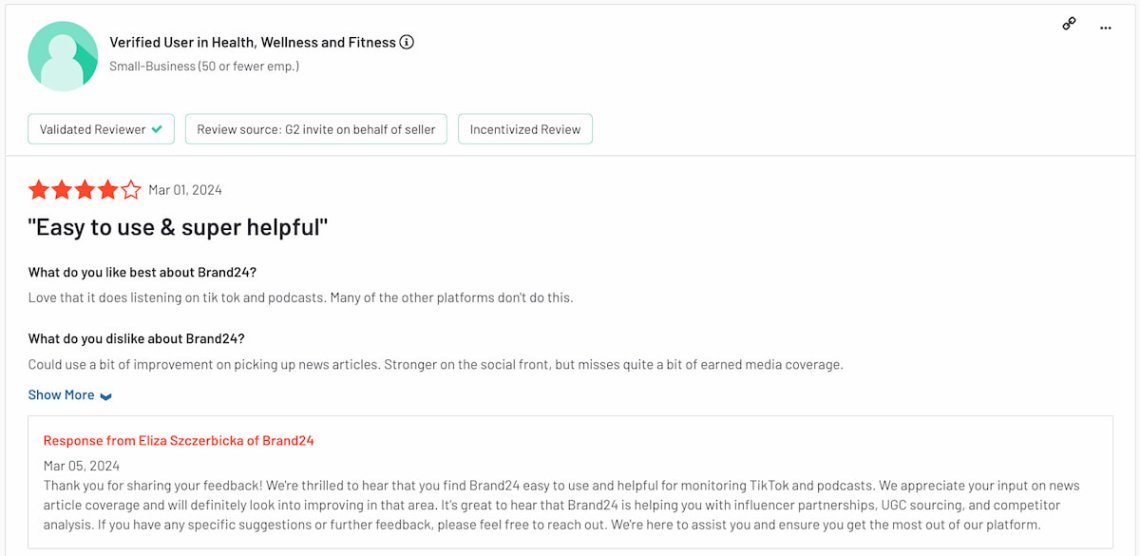
Plus, a strategy you should use to prevent negative feedback is simply encouraging happy customers to leave positive reviews and showcasing them in your marketing.
In the end, remember Warren Buffet’s words: feedback is a gift. Even a negative one, because it creates chance to build a better business.
If you struggle with managing negative reviews, check our article: How to Respond to Negative Reviews?
07 Build your niche expertise
Becoming an expert in your industry gives a powerful boost to your online reputation.
When people see you as a trusted authority, they are more likely to:
- Value your opinions
- Recommend your brand
- Buy your products or services
To build niche expertise, you should consistently share valuable insights.
How to do it?
1. Content creation
Your website is one of the most powerful brand assets for your reputation marketing efforts.
Why?
- First of all, it’s totally under your control. You can create and distribute content highlighting the brand’s positive aspects, values, achievements, community involvement, and customer success stories.
- Secondly, high-quality content has the potential to go viral, and that means boosting your reputation.
- Thirdly, creating valuable and quality content boosts your search engine optimization and brand visibility in search engines like Google.
If your blog posts appear on competitive search engine ranking pages, it proves your authority within your niche and boosts your brand’s online reputation.
2. Webinars
Hosting webinars is another excellent way to establish your niche expertise and enhance your online reputation.
Why?
- Webinars allow you to share in-depth knowledge directly with your audience,
- Educate people about your product,
- Engage with them in real time,
- Showcase your expertise in a more personal and interactive way.
By offering valuable, actionable insights, you strengthen your reputation, build trust, and foster relationships with your audience.
Additionally, you can invite industry experts or influencers to co-host your webinars.
This not only adds credibility to your event but also expands your reach when they share you on social media.

Speaking about collaboration…
- Partnerships
Partnerships can also play a crucial part in reputation management.
Collaborate with social media influencers, industry leaders, or other brands to co-create content or initiatives that can enhance the brand’s reputation.
Ensure that all collaborations and content reflect and promote your brand values to build trust and consistency.
When done right, influencer marketing can generate a lot of positive recognition on social media, amplifying positive brand content.
Try the best reputation marketing tool ever!
08 Educate employees
Believe it or not, educating your employees is crucial to reputation marketing.
Your employees can be powerful brand advocates.
Encourage them to share positive experiences and insights about the company on their personal networks.
Happy employees are a stamp of approval on your operations, and good employer branding can also be a part of your reputation marketing efforts.
Power up your reputation marketing!
09 Develop a crisis management plan
PwC’s Global Crisis and Resilience Survey shows that 96% of organizations experienced disruptions or crises in the period of 2021 – 2023.
And it’s worth underlining that 9 out of 10 of these crises were unrelated to the pandemic.
Meanwhile, TrustPilot’s research shows that a positive brand reputation is the most important factor for consumers when choosing to engage with a business.
These stats make one thing clear: your brand’s reputation is everything… and crises can happen anytime to anyone.
That’s why having a robust crisis communication plan is essential.
Prepare a brand reputation crisis management strategy to address potential threats effectively and ensure a swift, coordinated response when issues arise.
A reputation marketing software can be a great help for that:
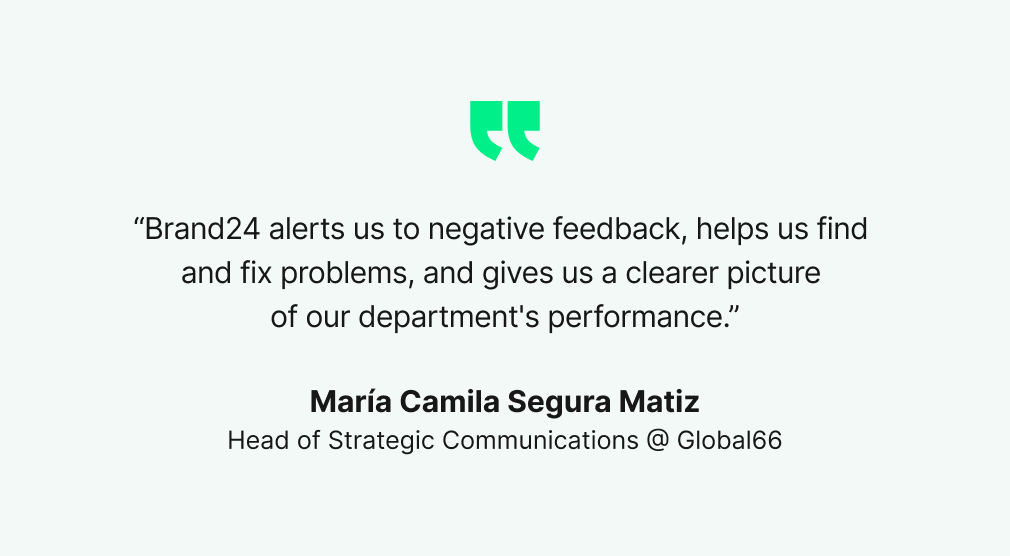
You can read the whole story in this case study.
Be ready for an incoming crisis!
10 Monitor your online reputation continuously
Reputation marketing is not an episodic but a continuous process of assessments and improvements.
All good strategies need analyzing and adjusting, as it is an ongoing process.
Therefore, you should make monitoring your online reputation a habit.
Regular monitoring not only helps you respond to feedback but also plays a crucial role in maintaining and enhancing your brand’s image across digital channels.
You can use reputation marketing software like Brand24 to measure progress toward objectives and adjust tactics as needed.
Okay, smarty, but how?
You can do it manually by analyzing your sentiment (I described it in detail in the first step).
But if you need a more automated and comprehensive approach, use the power of AI Insights.
In short, it’s an AI-powered tab showing the most important conclusions, charts and metrics in one place.
As we talk about monitoring your reputation, you should pay particular attention to Trends and Recommendations.
In practice, you can use info from Trends to stay one step ahead:
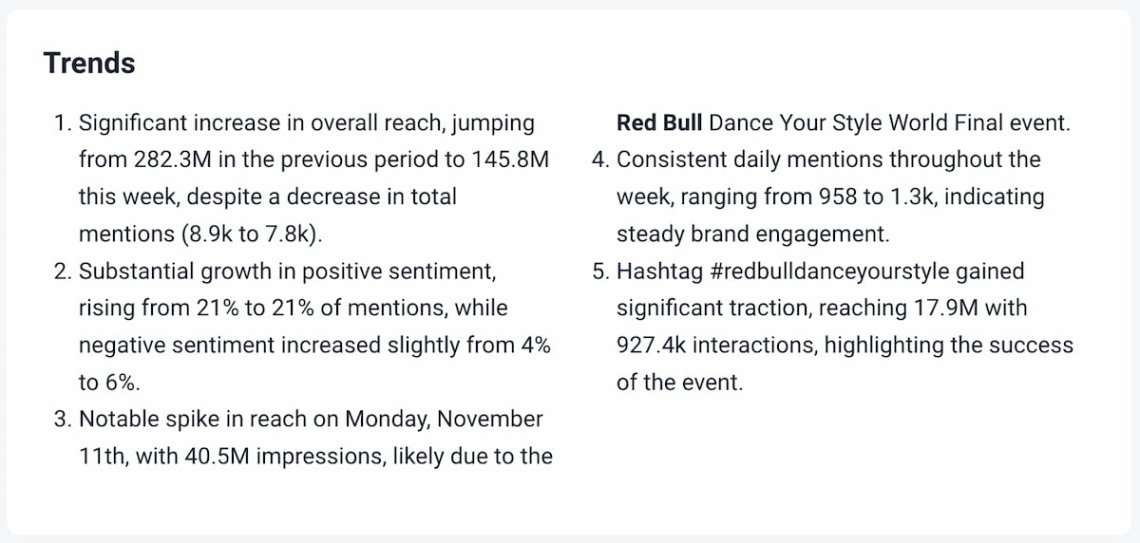
As for Recommendations, these are data-driven suggestions on how you can improve your reputation by enhancing your existing campaigns.
Use them wisely!
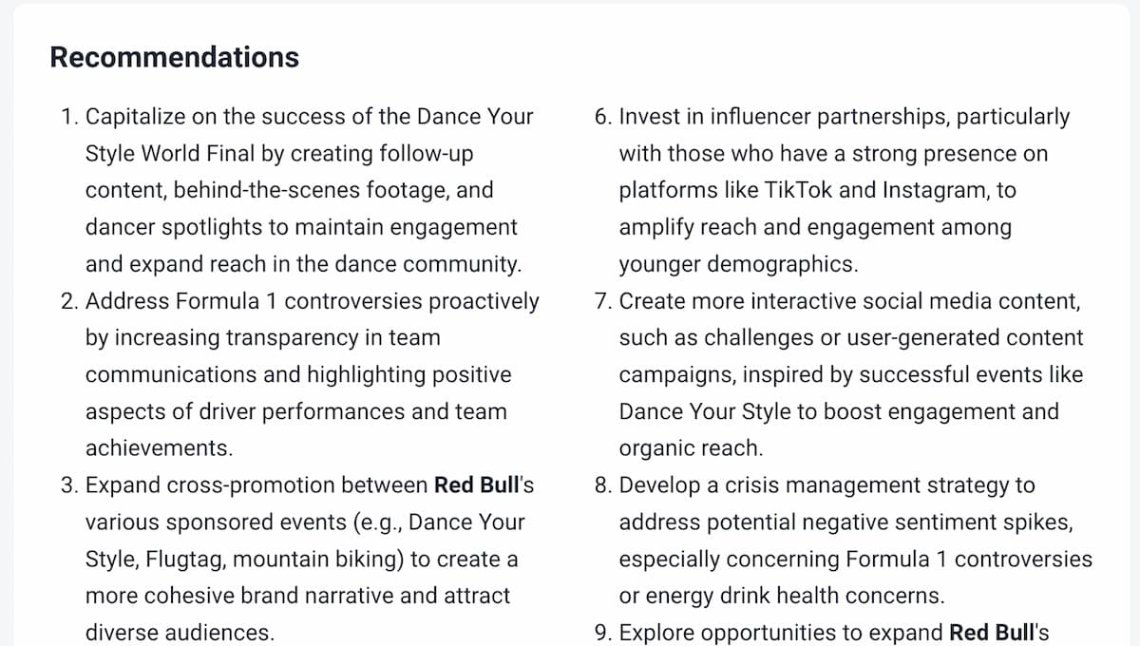
Use the power of AI to enhance your reputation!
Why is reputation marketing important?
This may be an obvious question, but there are some additional factors you should implement in reputation management in your business strategy.
Here’s a list of the 10 most important reasons for taking care of a reputation marketing strategy:
- Trust and credibility. A positive reputation establishes trust. Customers who trust a brand are more likely to purchase from it, remain loyal, and even pay a premium.
- Influence purchase decisions. Consumers often research brands before making purchasing decisions. Positive reviews and a good reputation can sway decisions in a brand’s favor.
- Word-of-mouth referrals. A strong reputation boosts word-of-mouth marketing. Satisfied customers are more likely to recommend the brand to others.
- Competitive advantage: In saturated markets, a good reputation can differentiate a brand from its competitors, making it a preferred choice for consumers.
- Higher customer loyalty. Brands with positive reputations generally experience higher customer loyalty and retention.
- Resilience in crises. Brands with solid reputations are better positioned to withstand crises. They often receive the benefit of the doubt and can recover more quickly.
- Financial benefits. A good reputation can lead to increased sales and profitability. Conversely, reputation damage can lead to significant financial losses.
- Talent attraction and retention. Companies with good reputations find it easier to attract and retain skilled employees.
- Lower marketing costs. Maintaining a good reputation can reduce marketing costs and customer acquisition costs, as positive word-of-mouth and trust alleviate the need for aggressive promotional campaigns.
- Stakeholder relations. A positive reputation facilitates better stakeholder relationships, including partners, suppliers, and investors.
To sum up:
Reputation is key in marketing and business. It underpins almost every aspect of consumer interaction with a brand and can significantly impact a company’s long-term success.
Boost your reputation marketing!
FAQ
What is reputation strategy?
A reputation marketing strategy refers to a planned and structured approach to shaping and maintaining the perception of a brand, company, or individual in the eyes of its stakeholders.
This strategy is essential for building trust, managing crises, differentiating from competitors, and achieving long-term business goals.
Monitor your online reputation in real-time!
What’s the difference between reputation marketing and management?
- Reputation management is about maintaining and protecting a brand’s image.
- Reputation marketing differs as it’s about using and enhancing that image to better achieve marketing objectives.
In practice, while reputation management focuses on monitoring and responding to reviews, feedback, and mentions to maintain or repair a brand’s image, reputation marketing goes further.
It actively promotes and amplifies positive reputation elements to boost marketing efforts.
You might also be interested in: 6 Expert Tips to Master Brand Reputation Management
What is a reputation example?
“Reputation” refers to the collective perception or assessment of a brand, company, individual, or entity based on past actions, behaviors, or performance.
Here are some examples to illustrate reputation:
- Apple is known for its design-centric approach and user-friendly products. The company has a reputation for producing high-quality, innovative tech devices.
- On the other hand, Volkswagen faced a reputation setback with the “Dieselgate” scandal when it was found manipulating emission tests.
Although they’ve taken steps to recover, the incident left a mark on their reputation for some time.
Prevent a PR crisis!
What is branding reputation?
Branding reputation, often referred to simply as brand reputation, is the perception and collective impression that consumers and other stakeholders have about a brand.
It is based on their experiences, interactions, and exposure to that brand’s messaging, actions, products, and services over time.
It’s the intersection of a company’s branding efforts (how it wants to be perceived) and people’s real-world opinions and feelings about the company.
Power up your reputation marketing!
Conclusion
It is more than just a strategy. Reputation marketing builds trust, attracts customers, and drives long-term business success.
Social listening tools like Brand24 ensure you stay ahead of potential issues and maximize your efforts.
You must accept the fact that crises are almost inevitable.
But with a well-thought-out crisis communication plan and a proactive approach, you can turn challenges into opportunities for growth.
By prioritizing your reputation and integrating it into your overall marketing strategy, you can create a lasting, positive impression that drives trust, inspires customer loyalty, and lets you grow.
Key takeaways:
- Reputation marketing is not a one-time effort but a continuous process. It requires a strategic approach and regular monitoring.
- Even negative feedback can be a gift – it provides valuable insights to improve and strengthen your business as well as enhance your brand awareness.
- Showcase success stories and case studies to highlight real-world results, build trust, and provide concrete results.
- Use AI tools like Brand24 to assess your current reputation and monitor your reputation marketing efforts.
Start Brand24 14-day free trial now and enhance your reputation marketing strategy!






